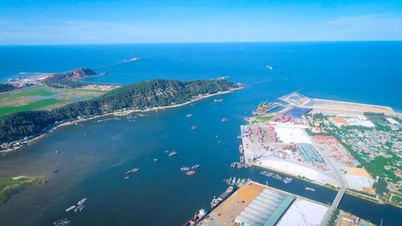Housing prices are skyrocketing, outstripping workers' incomes, even for finance and banking employees - the highest-paying industries - who cannot keep up.
Among 20 economic sectors (excluding international agencies and organizations) surveyed by the General Statistics Office for average income from 2010 to present, workers in the finance - banking - insurance sector have been leading for 10 years, in the periods 2010-2011 and 2013-2020. This group's income in 2010 was 4.8 million, and increased to 11.5 million in 2023.
According to financial reports of commercial banks in VN30 and Agribank , the average monthly income from salary and bonus of a bank employee increased from 21 million VND in 2014 to 36 million VND in 2023, an increase of 6-7% per year.
"Bank employees are always in the group of industries with the highest income, averaging from 25 to 40 million VND per month," Ms. Nguyen Thu Trang, Manpower brand director, Manpowergroup Vietnam - a corporation specializing in recruitment and human resource consulting, affirmed.
Despite their high salaries compared to the general level, the income growth of bank employees has not kept up with housing prices over the past 10 years. According to data from Savills Vietnam, the average primary price of class C, B and A apartments in the period 2014-2023 increased by 11%, 10% and 16% per year, respectively. The price level remained stable in the period 2015-2017, but then increased sharply, widening the gap between income and housing prices.
For example, in 2014, the average monthly income of banking and finance employees - the highest-paid group of workers - was equivalent to the price of 0.7 square meters of a class B apartment, or 1.05 square meters of a class C apartment. By 2023, this group's salary would only be enough to buy 0.5 square meters of a class B apartment and 0.72 square meters of a class C apartment.

Despite rising incomes, home ownership remains difficult due to significantly faster price increases. According to the General Statistics Office’s Labor and Employment Report, the average monthly income of a Vietnamese worker will increase from VND4.5 million in 2014 to VND7.5 million in 2022 – an increase of 7% per year, half the rate of primary apartment price increase.
By the third quarter, with an average monthly income of VND7.6 million, it is estimated that a household of two workers will have to spend 21-23 years of income to own a 55-60 m² apartment, assuming that housing prices do not increase. If the savings rate is 50% after paying for living expenses, the number of years will double.

Data from Numbeo - a global cost of living statistics platform - shows that Vietnam's House Price to Income (HPR) index in mid-2024 will reach 22.8 points, among the highest in Southeast Asia. This figure is nearly three times that of Malaysia and higher than many developed countries such as Japan, Singapore or South Korea.
The higher the HPR, the more difficult it is to own a home. Since 2014, Vietnam’s HPR has increased by 27%, from 17.8 points, clearly reflecting the gap between income growth and home prices. At the same time, Vietnamese people’s ability to repay loans is also very low, reaching only 0.4 points - lower than most Southeast Asian countries in the statistics, except for the Philippines.

The situation is more serious in large cities. Ho Chi Minh City recorded an HPR index of 32.4 points, 1.4 times higher than the national average. Meanwhile, the ability to repay loans was only 0.3 points, reflecting the difficulty in accessing housing. In Hanoi , the HPR index was lower than the national average at 20.6 points, but still among the high group in Asia.
"Housing prices increasing much faster than wages will rapidly increase income inequality," Dr. Le Kien Cuong, Banking University of Ho Chi Minh City, and colleagues stated in a 2021 study. Real estate market and income inequality in Vietnam: Current status and policy implications. According to him, some households are increasingly less likely to own a home in the future because they have to use their savings to rent a house.
Ms. Giang Huynh, Director of Research and S22M at Savills Vietnam, also said that if housing prices continue to increase faster than incomes, the gap between rich and poor will widen. People with average incomes and below will have difficulty accessing housing, leading to serious consequences for the stability of the market and society.
According to Professor Dang Hung Vo, former Deputy Minister of Natural Resources and Environment, the rapid increase in housing prices, exceeding income from wages, not only puts pressure on social security, but also promotes real estate speculation. Speculative money often waits for prices to increase, not going into production and business, causing negative impacts on inflation and currency value.
"Failure to curb speculation and the asymmetry between housing segments has inevitably led to the end of the tunnel for the current real estate market," he said.
In addition, Mr. Vo also pointed out that the real estate market plays an important role in production, business and the macro economy. This unstable market will negatively affect the entire economy as in recent years. In fact, the problem of housing suitable for people's financial capacity is a challenge not only for Vietnam. Many large cities in the world also face this pressure when the demand for housing increases due to the influx of immigrants.
Ms. Giang Huynh said that in Ho Chi Minh City and Hanoi, supply is not meeting demand. The reason is partly due to legal bottlenecks in project approval, slowing down the addition of new supply. In addition, the increase in land prices and construction costs also pushes up home prices.
According to a report by the Ho Chi Minh City Department of Construction, the city's construction price index increased sharply from 103 points in 2020 to 123 points in 2023, compared to the base level in 2015. Increased input costs have forced investors to set higher output prices to ensure project efficiency.

Looking at data from 2018 to present, Dr. Dinh The Hien also found that income and apartment prices are increasingly expanding. According to him, the reason is partly due to the gap between supply and demand between high-end and low-end segments in the market. Newly launched products have not met real housing needs because luxury apartments account for a large proportion. In addition, many buyers are investors who want to ensure profitability, so they continuously push prices up.
He also said that the chaos in the real estate market is partly due to lax management in some localities, especially in the southern region - the largest real estate market in the country.
According to Professor Dang Hung Vo, reforming real estate-related taxes is necessary to stabilize the market. In particular, the second real estate tax will help eliminate the virtual price of products due to speculation. To do this, one of the important solutions is to upgrade the data management infrastructure to make information on the real estate market transparent.
"This requires a specific roadmap and multi-dimensional research to be able to apply successfully," Professor Vo emphasized.
Sharing the same view, Dr. Dinh The Hien said that it is necessary to make management transparent and implement new laws through decrees to stabilize the market. In particular, the important issue at hand is to remove legal obstacles for projects, to soon increase new supply.
Source

























































































Comment (0)